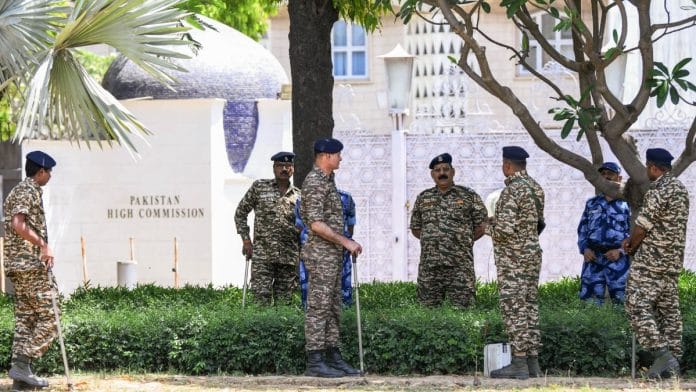New Delhi: As a part of its diplomatic response to the Pahalgam terrorist attack in Jammu and Kashmir, India Wednesday annulled the posts of defence advisers at Pakistan’s High Commission in New Delhi. The move is possible through the bilateral arrangements on diplomatic representation between the two countries, which set the framework for the staffing of the two high commissions.
On Wednesday evening, at a special briefing, India’s Foreign Secretary Vikram Misri said, “The Defence/Military, Naval and Air Advisors in the Pakistani High Commission in New Delhi are declared Persona Non Grata. They have a week to leave India…These posts in the respective High Commissions are deemed annulled.”
He also announced that India will withdraw its own defence advisers from its high commission in Islamabad. Apart from international conventions, such as the Vienna Convention on Diplomatic Relations, 1961, and the Vienna Convention on Consular Relations, 1963, the two countries also have bilateral arrangements when it comes to their respective diplomatic arrangements.
For example, the declaration of a diplomat as persona non grata, is diplomat-speak for the expulsion of an individual from a country. While the two international conventions allow any “receiving country”—in this case India—to expel a diplomat, the necessity to give the three Pakistani defence advisers a week to depart stems from a 1992 bilateral code of conduct for the treatment of diplomatic or consular personnel in India and Pakistan.
By deeming the posts of defence advisers as “annulled” India has expressed its desire to not to allow the existence of these posts in Pakistan’s High Commission in New Delhi. The punitive action is indicative of a further downgrading of diplomatic relations between New Delhi and Islamabad.
The Charge d’Affaires of Pakistan’s High Commission in New Delhi was summoned late Wednesday evening and informed of India’s diplomatic actions, following the Cabinet Committee on Security’s (CCS) hours-long meeting on Pahalgam attack.
The move to annul the defence advisers come after at least four gunmen armed with AK47 rifles sprayed bullets at tourists in Jammu and Kashmir’s Pahalgam Tuesday, as reported by ThePrint. The attack killed 26 Indian nationals and one foreign national. Late Wednesday evening, Misri also announced that the Cabinet Committee on Security (CCS) was informed of the cross-border linkage to the attack.
Staffing of respective high commissions
The High Commission of Pakistan in New Delhi also had four wings in operation: political and administration, defence, trade and information. India’s decision to expel the three defence advisers and the five support staff has essentially shut the entire defence wing.
According to existing bilateral agreements between New Delhi and Islamabad, the two countries agreed to allow advisers from the respective services in their militaries—army, air and naval—to serve at their respective missions.
For Pakistan, a brigadier-level officer was appointed as its army adviser, while a group captain and captain were its air and naval advisers, respectively. Similarly, India had a brigadier-level officer serving as its defence and army adviser in Islamabad, and a captain serving as a naval adviser. The air adviser in the High Commission of India in Islamabad was vacant before the government decided to withdraw the two serving advisers.
In terms of the strength of missions, India also announced the reduction of the overall number of members from 55 to 30. This reduction comes after nearly half a decade.
The last time India downgraded the strength of the Pakistan High Commission’s staff was in June 2020, when it pushed for a 50 percent decrease in personnel. This followed the expulsion of two Pakistani diplomats for espionage and the subsequent abduction and alleged torture of two Indian consular officials. At the time, the strength of the missions was reduced from 110 to 55.
Before 2020 and late Wednesday evening, the last time India asked for a similar reduction in staffing strength was in December 2001, following the terrorist attack at the Parliament of India.
Diplomatic relations between the two countries were severely impacted after India’s High Commissioner to Pakistan Ajay Bisaria returned to India in August 2019, following Islamabad’s decision to downgrade ties following the abrogation of Article 370 by the Parliament of India.
(Edited by Sanya Mathur)






